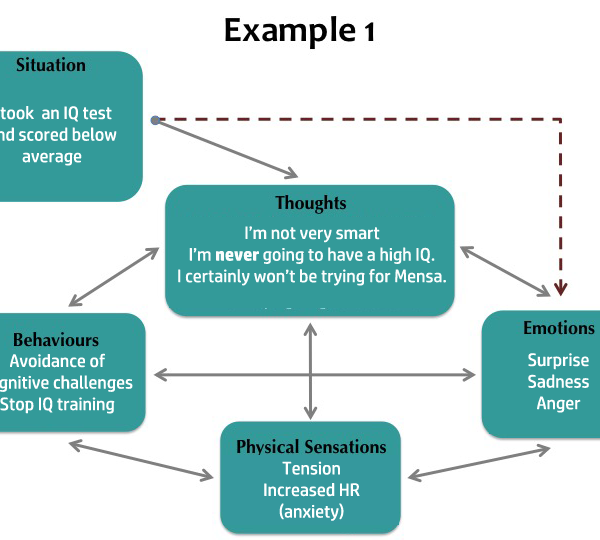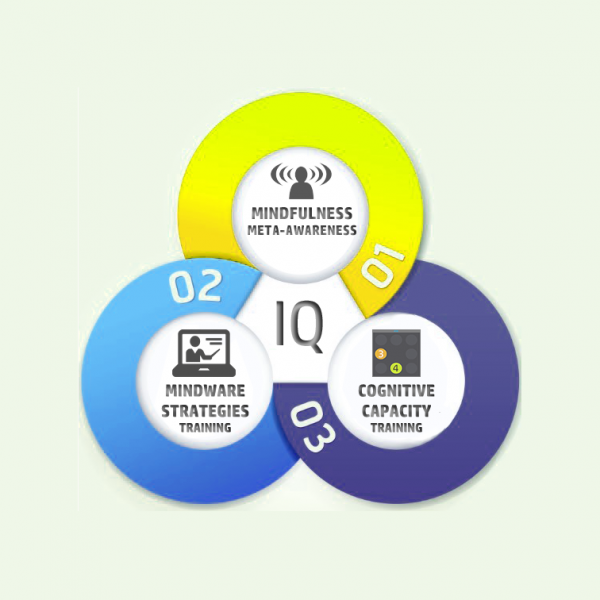Mental Attitude : Definition
Your ‘mindset’ – your beliefs, values, attitudes and motivations about your own mental capabilities
CBT
In this tutorial we will be looking at CBT (Cognitive Behavioral Therapy) techniques to promote a more constructive mental attitude for intelligence augmentation.
At its core CBT works on the assumption that our thoughts (including beliefs) mediate how we feel and behave, and that cognitive and behavioral techniques can lead to positive change in dysfunctional emotions and behaviors.

The direct link between the situation and our feelings is what we assume is going on, but actually our emotional response depends on our thoughts and beliefs about the situation – and these could be very different. Our emotions/feelings are also closely related to our physical states (e.g. energy levels, heart rate), as well as our behaviors (e.g. pro-active in solving problems and improving, or withdrawn and evasive). Here is an example relating to IQ.

CBT techniques identify automatic negative thoughts (e.g. ‘I’m never going to have a high IQ’) that are set off by certain triggers (such as test-taking, or evaluations). These are evaluated, and if found to be biased, over-generalizing and unhelpful, are replaced with more realistic and helpful thoughts. CBT also introduces behaviours that are more pro-active to promote progression and wellness.
IQ Mindware CBT Exercises
This 3-point training method is central to IQ Mindware training.
1. Mindfulness / Meta-Awareness
CBT should help us develop more meta-awareness and mindfulness of thoughts, emotions, physical responses, and behaviours – and how they interact.
2. Mindware Strategies
Identifying habitual triggers leading to automatic negative thoughts is a key aspect of cognitive behavioral therapy (CBT). It is also important in formulating problem solving strategies based on realistic evaluations of your situation.
Automatic negative thoughts can be unrealistic when they involve any of the following:
- All-or-nothing thinking. Seeing situations in absolute (black or white) terms, without recognizing the middle ground (e.g. success / failure, perfect / worthless).
- Over-generalizing. Drawing sweeping conclusions on the basis of one or two incidents – such as when we say something is ‘always’ or ‘never’ the case.
- Negative filtering / Downplaying positives. Only focusing on negatives. Minimizing positives by ignoring them or telling yourself they aren’t important.
- Labelling. Describing yourself or others using global labels (‘smart’, ‘not-smart’), rather than recognizing potential for change, or the different shades of reality.
- Blaming. Focusing on who is to blame, rather than what you can do about a situation.
- Emotional reasoning. Believing something is true because it ‘feels’ true. Relying too much on feelings to guide decisions.
- Catastrophizing. Blowing things out of proportion – e.g. telling yourself something was too traumatic to ever want to face again.
Try first to identify any thinking / beliefs like this with respect to your cognitive goals or aspirations – as well as the situations that trigger these thoughts. Write them down. Articulate them. Ask: is my thinking here overly negative, biased and unhelpful? If so, try to formulate substitute thoughts to the trigger situations that are more realistic and helpful – e.g. ‘Intelligence is not fixed in stone – it can develop’; ‘I might score very differently on a similar test in the future’, ‘I value the feedback here – it shows that I have something to work on and improve’. Also, if you find yourself withdrawing from situations that challenge you cognitively, deliberately be more pro-active and challenge-seeking in your behavior. Commit to a brain training program, learning something new, travelling and having to adapt to novel situations. Physical exercise is actually a good starting point here, generally improving mood and positivity, and helping you be more pro-active.
3. Cognitive Capacity (Gated DNB) Training
Committing to HighIQPro’s gated dual n-back training helps develop the kind of attention control you need to substitute more unbiased and helpful thoughts for automatic, negative ones that might otherwise trigger ruminations and overwhelm your sense of ‘belief options’. Initially it may take a lot of effort to repeatedly suppress and replace your negative reactive, thinking. Gated DNB training can help with that considerably.


